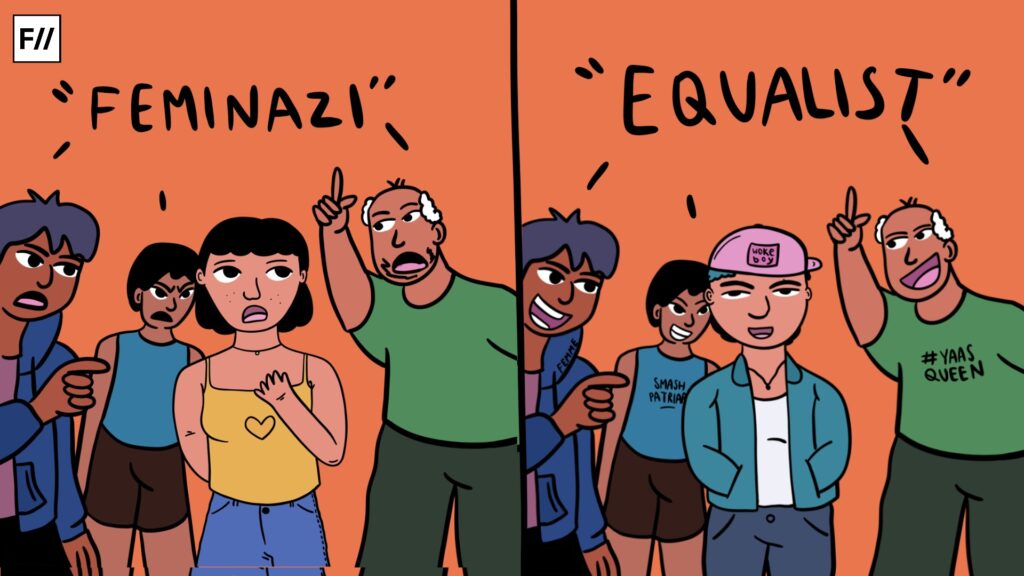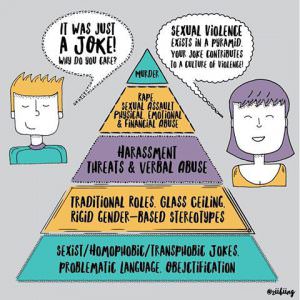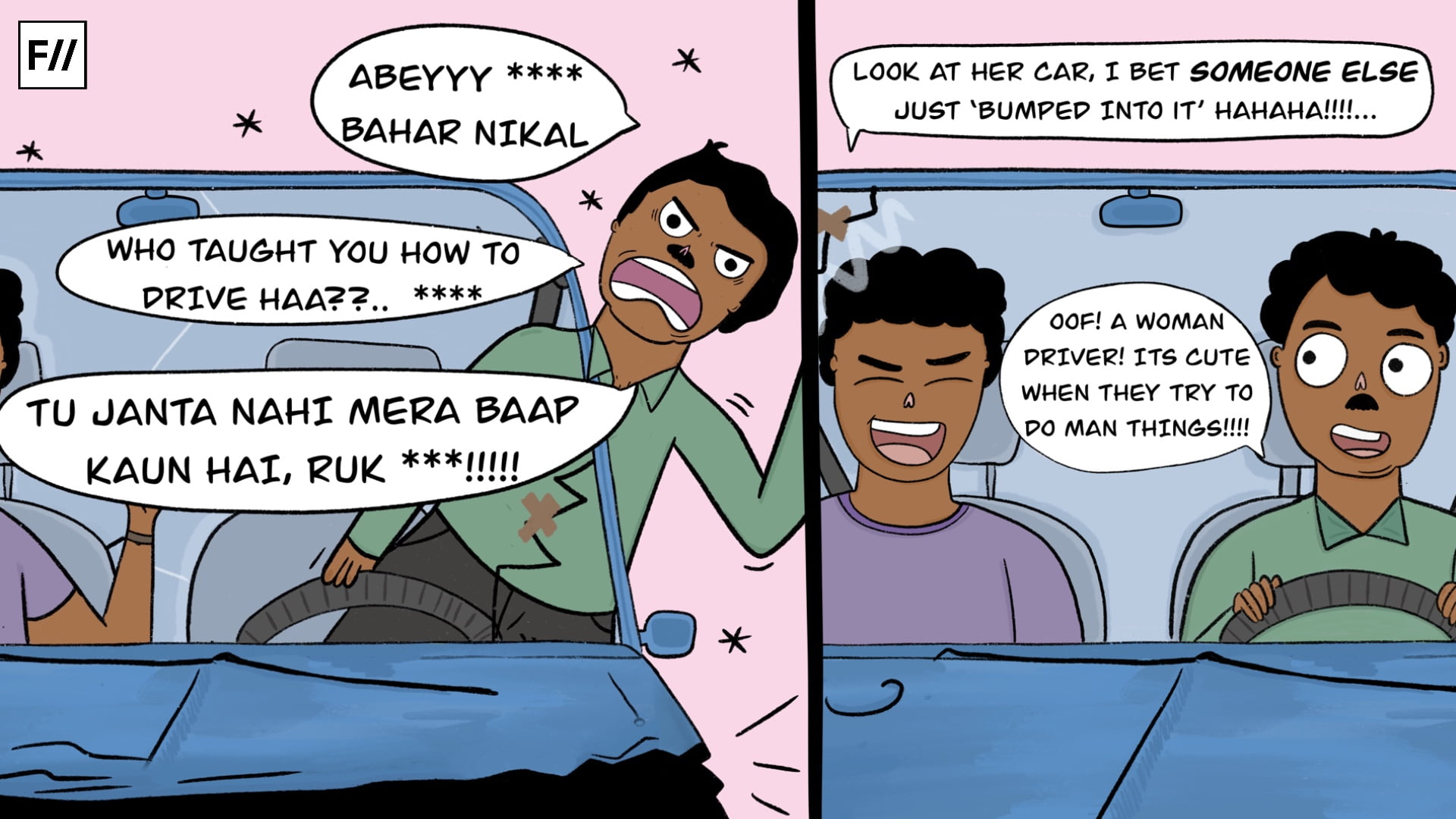Trigger warning: foul language consistently used.
“Can rape jokes be funny at all, is the question.
Can any part of the rape joke be funny. The part where it ends — haha, just kidding! Though you did dream of killing the rape joke for years, spilling all of its blood out, and telling it that way.
The rape joke cries out for the right to be told.
The rape joke is that this is just how it happened.
The rape joke is that the next day he gave you Pet Sounds. No really. Pet Sounds. He said he was sorry and then he gave you Pet Sounds. Come on, that’s a little bit funny.
Admit it.”
– Patricia Lockwood (2013)

George Orwell wrote “If thought corrupts language, language can also corrupt thought. A bad usage can spread by tradition and imitation, even among people who should and do know better.”
The harbingers of free speech have been vehement in their stances: it’s just a joke, it’s just a word, how can it be problematic? How can one person who stops saying “retarded” in a derogatory manner change anything? Honestly, is there a list of forbidden words on a secret feminist scroll that I should be using? How do I access this holy grail of words?
Also Read: Online Abuse and the Misappropriated Tool of “Free Speech”.
Language matters. It always has. Language has been shown to shape thought as much as thought shapes language: in defining spatial reasoning and in describing how we understand casualty. Patterns in language offer a glimpse into a culture: the way it thinks, speaks and behaves within itself. Language uses us as much as we use language. The simplest example would be how the word “spinster“ referred to women who spun, not unmarried women against whom the word has come to be used as a harsh insult at living an “unfulfilled life”. The word now carries within itself decades of burden borne by women.
As the principal means by which we conduct our social lives, language expresses the beliefs, ideas, and attitudes that exist in a culture. Members who identify themselves as part of a set social group (family/nation/profession) acquire a common way of viewing the world through their interactions with one another. These common ways are reinforced through institutions like school, professions, families, and finally, laws. What they choose or choose not to say (in either a negative/positive way) then reflects the way that culture behaves towards a particular issue.
The word “gay” was widely used to mean cheerful and happy, whereas now, it primarily denotes homosexuality. Even the word “straight” just meant, you know, at once/a straight line, but gradually came to be used to refer to heterosexuals (implying that they were the norm but homosexuals were crooked or bent). Language alters perceptions of things owing to its ability to have positive or negative attributes.
Here are some problematic examples of problematic language we use in our day to day lives:
Have some balls/don’t be such a cunt
To have some balls is to magically acquire the mighty bastion of power and virility, to shed the cloak of weakness and transform into a warrior of strength. We hear & use this phrase every day in different contexts to implore someone to be a little more courageous. When we think about the implications behind it, we realize that courage and bravery have been associated historically with men – the connection between bravery and male genitalia is a reference to the very same. On the other hand, to be a “cunt” is to have a derogatory and vile word thrown at you, an insult. But hey, it’s associated with the vagina. That can’t be a coincidence, can it? Men are expected to be strong and dominant, aggressive in their demands; while women are expected to be submissive in their roles. An insult aims at reprimanding you for not behaving the way you should, and that’s exactly what being called a cunt is. Behave like the ideal male gender, be perfect.
Slut/Motherfucker/Son of a Bitch
Insults hurled at women are often in way of policing their sexuality: what to do, how much to do, and with whom. Behaviors that are considered unladylike are shunned and converted into insults like whore, bossy, slut, boyish, tomboy. On the other side of the spectrum, insults directed at men are by and large centered around weakness. This weakness is linked to behavior attributable to women. References to femininity or ladylike behavior is used as an insult to men. For example: words like pussy, cunt, son of a bitch, mother fucker, sissy, throw like a girl, cry like a girl and more.
Working Woman
What’s the big deal with this phrase? Well, how often have you come across the phrase working man? Therein lies your answer. For a man, the norm is that he works and is the breadwinner for the family whereas for a woman, the norm is that she is dependent economically and does not work (taking into account the fact that domestic labor is still not considered work, but merely an act of love). The standard then is that a woman is a homemaker and the deviation is that of a woman who earns wages. When we start noticing tiny details like this in our communication, we notice the extent of bias pervading it.
Feminazi

That a movement aimed at equality for the genders & liberation of women is compared to one of the most horrific ideologies that single-handedly attempted to wipe out an entire race is an indictment to the fact that feminism is grossly misunderstood. A civil rights movement striving for better conditions for women, when compared with a holocaust, reduces the seriousness with which the movement is viewed. The thing is that words have implications beyond just being uttered. When a large number of people (starting from word of mouth and spreading through social media) begin to propagate distaste towards the movement, the support the movement will be able to call upon in times of need will drop immensely. In such a case, a person who is in genuine need of the umbrage of the movement will face the fall for the hate and distrust being thrown at Feminism. While constructive criticism and constant evolution are quintessential to the survival and success of Feminism, obliterating the worth of the movement by making comparisons that subconsciously alter people’s perception of it only causes more harm to real lives than you can imagine.
Rape jokes

The diagram is an apt summation of everything that is wrong with a rape joke. No, it is not just a joke and no, we are not being oversensitive. When a serious issue is casually joked about, it stops being taken seriously. It becomes an everyday matter that people are used to, not worth a second glance. When phrases like rape that paper, I raped my exam, don’t rape the fun are interspersed with colloquial English, it reduces the severity of the matter at hand. Jokes are a method to poke fun at a situation. The plight of a survivor in the face of such jokes is humiliation for their issues are not being handled delicately. More importantly, it must never be reduced to a casual word we use that does not hurt our conscience. Let us always be outraged by rape, let us never stop kicking up a fuss about it.
Retarded/Crazy
The word retarded is used to demean and delegitimise disabled persons. What this does is further isolate them from feeling safe in society and they continue to be left unaccepted. The word is callously thrown around at anyone who is not behaving “normally” and is laughed at. When someone does something that is considered silly, it is retarded. The truth of the matter is that mental illness if not a choice undertaken by a person, but a living condition thrust upon them. When their behavior is seem worthy of ridicule, we are only harming them. Crazy, on the other hand, is regularly used in discourse to shun someone who is being “too emotional” or “too unstable”. This, too, destroys the intensity of the issue and creates a travesty out of it.
We came, we saw, we reclaimed
Words are constantly being reclaimed by persons against whom they have historically been wielded as a weapon. From reclaiming Slut (Slut Walks), Cunt (Vagina Monologues), Faggot and Queer among many other, reclamation has been a means to end the stigma and bias attached with language. Reclaiming a word involves wearing a word with pride and taking away its ability to hurt someone.
Certain language must be respected for its connotations and never made a mockery of: rape, retard and crazy are a few that must always be addressed with the gravity they command. Why must you change yourself though? Free speech! Free speech, however, comes at the cost of the lives of many others who are struggling for acceptance in a hostile society. It may take you 3 seconds of a few conversations to actively edit out certain vocabulary from your mind, but it will take those who are affected a lifetime of trauma to cross over. So yes, be oversensitive, be a buzzkill, constantly try to alter your language and explain the same to others. The least that you will do is place a seed of doubt in a person’s mind about using a problematic word.
Language both liberates and shackles: it’s up to us to decide which one of the two deserves a voice.
Extra Reading
- Deborah James, Gender-Linked Derogatory Terms and Their Uses by Men and Women (1998)
- Robin Lakoff, Language and Woman’s Place (1973).
About the author(s)
Shilpa Prasad is a law student who loves books, poetry and her guitar.





Lovely piece, Shilpa. The shaping of throughts via language is a reality. I have been aghast at people using ‘rape’ so trivially in conversations. And what’s the deal with cursing a man with “motherfucker” and “son of a bitch”? The insult is aimed at the women in their lives, an insult so severe that it would hurt them because the women are their possessions.
Even otherwise reasonable people resort to using bad language in certain contexts. Their justification: BC MC bolne mein jo feel aati hai Woh kisi aur cusswords mein nahi aati. Shall we create new cusswords for them?